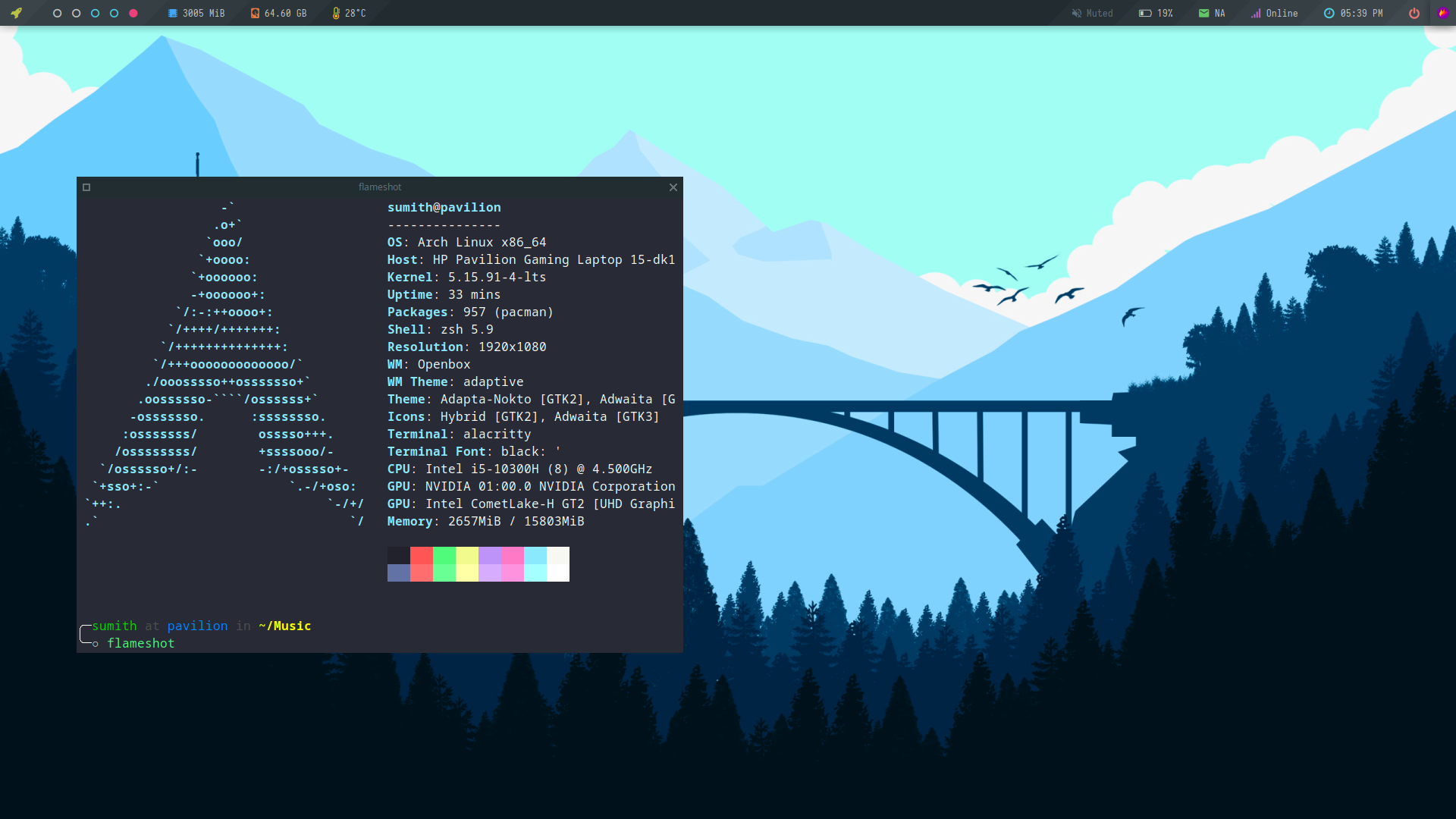Easy Openbox Window Manager
It is a simple script that will install Openbox Window Manager.
How to install (Automatic)
--Experimental--
This is only for arch linux distro's
bash setup.sh --installHow to install (Manual)
Installing Openbox
On Arch based distros, use the following command:
-
Install required dependencies
sudo pacman -S xorg xorg-font-util xorg-xrdb xorg-xdm xorg-server xorg-xinit sxhkd \ xfce4-settings xfce4-terminal polybar ranger rofi startup-notification thunar \ openbox obconf xarchiver dbus desktop-file-utils elinks gtk2 gtk3 man flameshot \ zsh git vim nano curl wget jq xarchiver firefox imagemagick geany alacritty gedit \ bc bmon calc calcurse feh htop scrot mpc mpd mutt ncmpcpp neofetch openssl leafpad \ xmlstarlet xbitmaps ranger xcompmgr nitrogen brightnessctl alsa-utils imv maim mpv pamixer
Note: I'm using Arch Linux for this tutorial. However, the below commands and steps will be same for other arch linux distros.
-
Clone this repository
cd ~/ git clone https://github.com/sumithemmadi/EasyOpenboxWM.git cd EasyOpenboxWM
-
First you need to backup your
.configordotfilesrun below command in the same directory (EasyOpenboxWM). -
If you don't want any backup, you can ignore this part.
configs=($(ls -A $(pwd)/files)) for file in "${configs[@]}"; do if [[ -f "$HOME/$file" || -d "$HOME/$file" ]]; then { mv -u ${HOME}/${file}{,.old}; } fi done
-
Run below command to install open box config files.
configs=($(ls -A $(pwd)/files)) for _config in "${configs[@]}"; do cp -rf $(pwd)/files/$_config $HOME; done
-
And wait for some time untill installation is done.
Initialize And Start Openbox
Add openbox to the .xinitrc file:
echo “exec openbox-session” > ~/.xinitrcStart Openbox Window Manager:
startxKeybindings
Here's some shortcut keys you want to use to speed up your work. For more, Right click on desktop > Keybinds
| Keys | Action | ----- | Keys | Action |
|---|---|---|---|---|
W-1 |
Go To Desktop 1 | S-W-1 |
Send To Desktop 1 | |
W-2 |
Go To Desktop 2 | S-W-2 |
Send To Desktop 2 | |
W-3 |
Go To Desktop 3 | S-W-3 |
Send To Desktop 3 | |
W-4 |
Go To Desktop 4 | S-W-4 |
Send To Desktop 4 | |
W-5 |
Go To Desktop 5 | S-W-5 |
Send To Desktop 5 | |
W-S-Left |
Send To Prev Desktop | W-S-Right |
Send To Next Desktop | |
A-Tab |
Next Window (Current Workspace) | W-Tab |
Next Window (All Workspaces) | |
W-h |
Move to TopLeft | W-j |
Move to BottomLeft | |
W-k |
Move to TopRight | W-l |
Move to BottomRight | |
W-Left |
Move To Left Edge | W-Right |
Move To Right Edge | |
W-Up |
Maximized | W-Down |
Unmaximized | |
W-q/c |
Close Windows | A-r/m |
Toggle Resize/Move | |
W-Space |
Openbox Menu | W-p/A-F1 |
App Launcher | |
W-d |
Toggle Desktop | W-v |
Set Tasks | |
W-f |
File Manager | W-e |
Text Editor | |
W-t/return |
Terminal | W-w |
Web Browser | |
W-x |
Exit Menu | W-m |
Music Menu | |
W-b |
Battery Menu | W-n |
Network Menu | |
C-A-v |
Vim | C-A-r |
Ranger | |
C-A-h |
Htop | C-A-n |
Nano |
Additional Tools
Install Paru AUR helper in Arch Linux, EndeavourOS, Manjaro Linux
Installing Paru in Arch Linux is easy!
-
First, install git and base-devel package group that includes tools needed for building (compiling and linking) packages from source.
sudo pacman -S --needed git base-devel
-
Git clone Paru repository using command:
git clone https://aur.archlinux.org/paru-bin.git
This command will download the contents of the Paru GitHub repository in a local directory named paru-bin
-
Change into the paru-bin directory:
cd paru-bin -
Finally, build and install Paru AUR helper in Arch Linux using the following command:
makepkg -sri
You can use
parufor install packages from AUR
oh-my-zsh
-
Setup zsh with oh-my-zsh framework.
paru -S oh-my-zsh-git oh-my-zsh-plugin-syntax-highlighting oh-my-zsh-plugin-autosuggestions
Additional Information
- Edit ~/.local/bin/email and put your Email ID and Password (Use an App password) to show unread mails on polybar.
- You may need to edit some config files accoring to your need (~/.mutt/muttrc)
